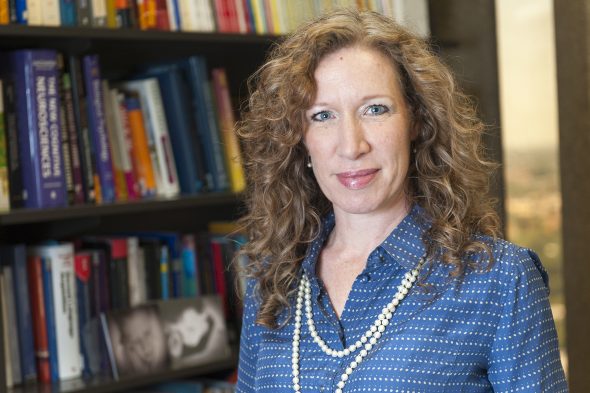Can adults master a second language?

The earlier in life you tackle a new language, the more proficient you tend to be, especially with pronunciation. “But that doesn’t mean it’s impossible if you start late,” says Kara Morgan-Short. Photo: Roberta Dupuis-Devlin/UIC Photo Services
Kara Morgan-Short’s fascination with helping adults master a second language stems from her undergrad days at the University of Texas at Austin.
“When I started learning Spanish, I did very well on tests, but to speak it I felt a lot of anxiety,” she said. “Then when I went to Spain [on a study-abroad program], I hardly ever spoke the language, because if I couldn’t speak it perfectly I didn’t want to say anything at all.”
After graduation, Morgan-Short became a teacher of Spanish and English as a second language in the Texas and Kentucky public schools. “After about five years I really began to wonder about the way we teach language,” she said. “That question led me to return to school for an MA in the teaching of language.”
That was at the University of Southern Mississippi in Hattiesburg. For her doctorate, at Georgetown University, she investigated how adults learn second languages. Today, as an associate professor of Spanish linguistics and psychology in the College of Liberal Arts and Sciences, Morgan-Short continues her research on language acquisition.
When her studies exposed her to research and theory, “it really grabbed me,” she said. “I was completely fascinated with these questions. Why is it easy for some people to learn a language? How is the best way to teach?”
The earlier in life you tackle a new language, the more proficient you tend to be, especially with pronunciation. “But that doesn’t mean it’s impossible if you start late,” she said.
Why does learning a second language come more easily to some?
In her research, study subjects wear a cap studded with electrodes as she analyzes brain waves in relation to what they’re hearing. “We were able to show a neural, or brain, signature in second language learners typical of what you see in native speakers,” she said.
She trained people in one of two ways — explicitly, giving them the rules of grammar, and immersion-style, exposing them to the language but saying nothing about grammar.
“Both groups talked about moves on a game board — move a piece up and left, this piece captures that piece,” she said. “Both learned the language really well, but the immersion-based showed the most native-like brain signature.”
She’s not sure why, but suspects that teaching grammar somehow interferes with a natural learning process. “More recently I’ve been interested in why some learn a second language very easily, while for others it’s very hard,” Morgan-Short said.
That led to research on two types of memory systems — declarative, pertaining to facts and information, and procedural, for learning habits and routines.
“Our publication this summer showed that people who used parts of the brain associated with procedural memory had an advantage,” she said. “Ultimately the best way of teaching may not be the same for everyone, based on their different cognitive strengths. Different learners may need different types of instruction to be most successful. We have a lot of research to do, to be able to make that happen, but that’s where the research is aiming.”
Morgan-Short joined UIC in 2007. She is director of the Cognition of Second Language Acquisition laboratory and associate editor of the journal Language Learning.
Because her father was in the military, Morgan-Short grew up in a succession of places — “Texas, Oklahoma, California, Germany, Louisiana, Georgia and back to Texas, all by the eighth grade,” she recalled.
She is married to Jeff Short, a manager at the Young Presidents Organization, a formal networking group for people who became CEOs of larger companies before age 40. They live in Oak Park with their son, Kai, 13, and daughter, Aria, 10.
Morgan-Short runs four miles, three times a week, and enjoys doing 5Ks with her family. Family travels have taken them to Spain twice.
“I’m trying to raise the kids bilingually,” she said. “They were at a camp in Spain this summer, learning by immersion.”
As for her, “I have reading and listening proficiency in Italian and Portuguese, but mostly I only speak English and Spanish.”
